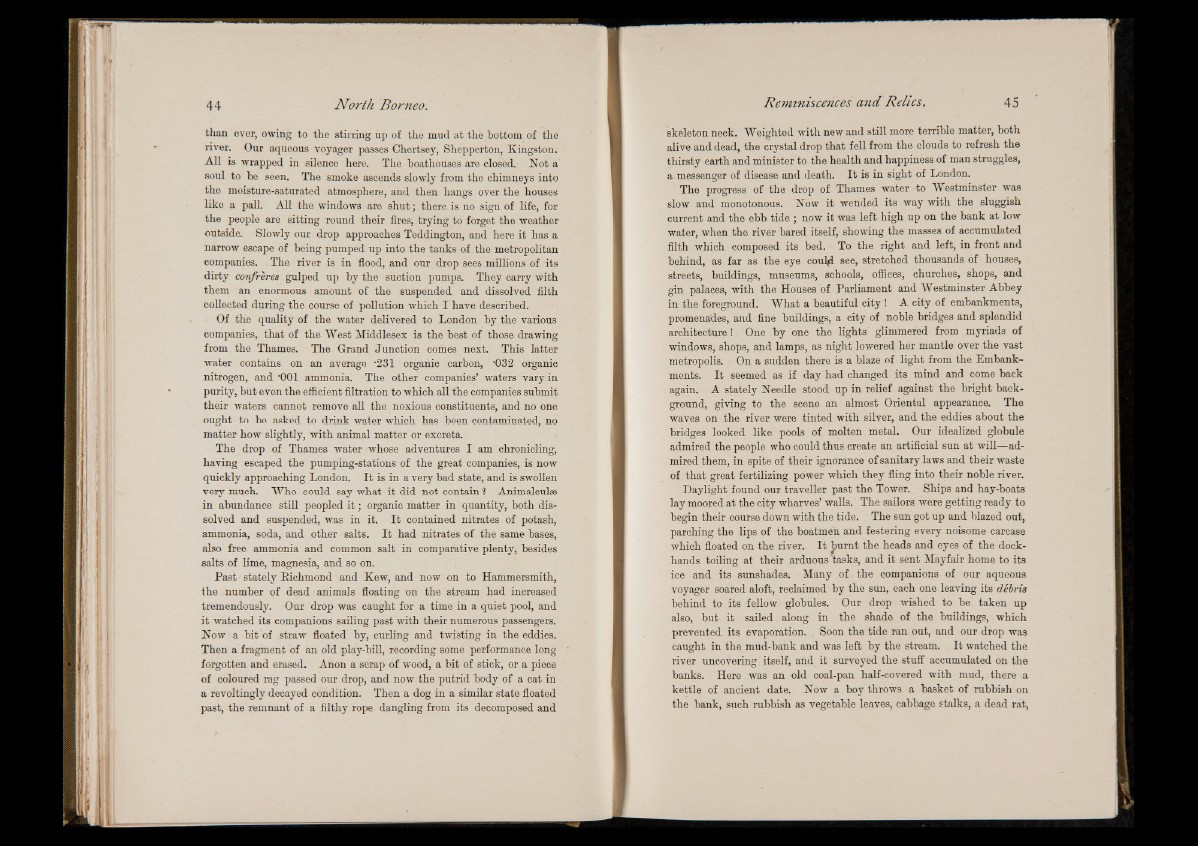
than ever, owing to the stirring up of the mud at the bottom of the
river. Our aqueous voyager passes Chertsey, Shepperton, Kingston.
All is wrapped in silence here. The boathouses are closed. Not a
soul to be seen. The smoke ascends slowly from the chimneys into
the moisture-saturated atmosphere, and then hangs over the houses
like a palL All the windows are shut ; there is no sign of life, for
the people are sitting round their fires, trying to forget the weather
outside. Slowly our drop approaches Teddington, and here it has a
narrow escape of being pumped up into the tanks of the metropolitan
companies. The river is in flood, and our drop sees millions of its
dirty confreres gulped up by the suction pumps. They carry with
them an enormous amount of the suspended and dissolved filth
collected during the course of pollution which I have described.
Of the quality of the water delivered to London by the various
companies, that of the West Middlesex is the best of those drawing
from the Thames. The Grand Junction comes next. This latter
water contains on an average ‘231 organic carbon, '032 organic
nitrogen, and '001 ammonia. The other companies’ waters vary in
purity, but even the efficient filtration to which all the companies submit
their waters cannot remove all the noxious constituents, and no one
ought to be asked to drink water which has been contaminated, no
matter how slightly, with animal matter or excreta.
The drop of Thames water whose adventures I am chronicling,
having escaped the pumping-stations of the great companies, is now
quickly approaching London. It is in a very bad state, and is swollen
very much. Who could say what it did not contain 1 Animalculæ
in abundance still peopled it ; organic matter in quantity, both dissolved
and suspended, was in it. I t contained nitrates of potash,
ammonia, soda, and other salts. I t had nitrates of the same bases,
also free ammonia and common salt in comparative plenty, besides
salts of lime, magnesia, and so on.
Past stately Richmond and Kew, and now on to Hammersmith,
the number of dead animals floating on the stream had increased
tremendously. Our drop was caught for a time in a quiet pool, and
it watched its companions sailing past with their numerous passengers.
How a bit of straw floated by, curling and twisting in the eddies.
Then a fragment of an old play-bill, recording some performance long
forgotten and erased. Anon a scrap of wood, a bit of stick, or a piece
of coloured rag passed our drop, and now the putrid body of a cat in
a revoltingly decayed condition. Then a dog in a similar state floated
past, the remnant of a filthy rope dangling from its decomposed and
skeleton neck. Weighted with new and still more terrible matter, both
alive and dead, the crystal drop that fell from the clouds to refresh the
thirsty earth and minister to the health and happiness of man struggles,
a messenger of disease and death. I t is in sight of London.
The progress of the drop of Thames water -to Westminster was
slow and monotonous. How it wended its way with the sluggish
current and the ebb tide ; now it was left high up on the bank at low
water, when the river bared itself, showing the masses of accumulated
filth which composed its bed. To the right and left, in front and
behind, as far as the eye coufyl see, stretched thousands of houses,
streets, buildings, museums, schools, offices, churches, shops, and
gin palaces, with the Houses of Parliament and Westminster Abbey
in the foreground. What a beautiful city ! A city of embankments,
promenades, and fine buildings, a city of noble bridges and splendid
architecture! One by one the lights glimmered from myriads of
windows, shops, and lamps, as night lowered her mantle over the vast
metropolis. On a sudden there is a blaze of light from the Embankments.
It seemed as if day had changed its mind and come back
again. A stately Heedle stood up in relief against the bright background,
giving to the scene an almost Oriental appearance. The
waves on the river were tinted with silver, and the eddies about the
bridges looked like pools of molten metal. Our idealized globule
admired the people who could thus create an artificial sun at will—admired
them, in spite of their ignorance of sanitary laws and their waste
of that great fertilizing power which they fling into their noble river.
Daylight found our traveller past the Tower. Ships and hay-boats
lay moored at the city wharves’ walls. The sailors were getting ready to
begin their course down with the tide. The sun got up and blazed out,
parching the lips of the boatmen and festering every noisome carcase
which floated on the river. I t burnt the heads and eyes of the dock-
hands toiling at their arduous tasks, and it sent Mayfair home to its
ice and its sunshades.- Many of the companions of our aqueous
voyager soared aloft, reclaimed by the sun, each one leaving its debris
behind to its fellow globules. Our drop wished to be taken up
also, but it sailed along in the shade of the buildings, which
prevented its evaporation. . Soon the tide ran out, and our drop was
caught in the mud-bank and was left by the stream. It watched the
river uncovering itself, and it surveyed the stuff accumulated on the
banks. Here was an old coal-pan half-covered with mud, there a
kettle of ancient date. How a boy throws a basket of rubbish on
the bank, such rubbish as vegetable leaves, cabbage stalks, a dead rat,